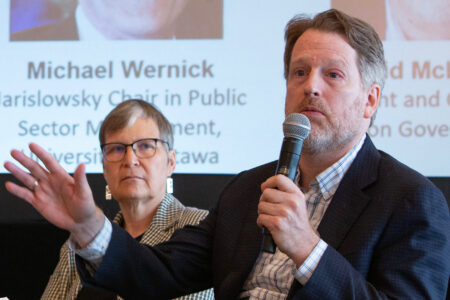
With Canada gearing up for the federal election this fall, the usual subjects — the environment, the economy and immigration — are likely to dominate pre-election debate. But in an increasingly interdependent world, are we paying enough attention to foreign policy?
The polling data are clear: Canadians rarely vote for political parties or candidates because of their foreign policy platforms. Canadian journalists often take this as conventional wisdom and pitch their election coverage through a narrow domestic lens. Yet, many of our domestic policy concerns are shaped, if not determined, by international affairs. So, foreign policy does and should matter to Canadians and to our journalists.
Canadians who are concerned about the environment and climate change ought to care about the parties’ policies on international coalitions working to reduce greenhouse gas emissions, stop global warming and find ways to adapt to climate change. If nations fail to support measures such as the 2016 Paris Agreement, climate change cannot be tackled effectively. The success of the Paris Agreement and many other international conventions and agreements is resting on whether the Trump administration will continue to undermine them. What happens in Washington could greatly influence how our future government will tackle climate change.
Similarly, with the rise of nationalism and right-wing populism throughout Europe — from the Alternative for Germany party to Austria’s Freedom Party to the United Kingdom Independence Party in Britain — we are seeing elected officials increasingly vote against policies that protect our shared environment. They’re among the climate change deniers and skeptics working to undermine multilateral legislation like the Paris Agreement in the European Parliament and elsewhere. Similarly, the populist Brazilian President Jair Bolsonaro’s continued deregulation of environmental safeguards, funding cuts to environmental groups and encouragement of farmers to clear Amazonian lands have contributed to deforestation and the resulting fires throughout the Amazon. One of the most important sources of global biodiversity is literally burning because of the policies of a populist leader in our hemisphere.
Immigrants’ decisions to come to Canada are often shaped by the policies and conditions of their countries of origin. The influx of Syrian refugees in 2016 would not have happened had there not been repression at the hands of the Assad regime. Similarly, Venezuelan refugees are arriving in growing numbers thanks to the incompetence and brutishness of the Chavez and Maduro governments.
Our top source countries for immigrants — the Philippines, India and China — are all led by populist nationalists who are rolling back civil liberties and making life more difficult for their domestic ethnic and religious minorities. The consolidation of power in China is also pushing some people to leave or to seek a safe haven for their assets and wealth. Undoubtedly, global perceptions about Canada and our foreign policy are significant pull factors, attracting would-be immigrants from around the world. Rising housing prices in Canada have a global context: the rising authoritarianism that is an important push factor for emigration.
Our economic prosperity is a perennial concern of voters. Here again, foreign policy is a factor, shaping our national economic growth. With multilateral trade agreements like the US-Mexico-Canada free trade agreement still on the legislative docket in the US, whichever Canadian party wins in October will have a key foreign policy issue to contend with that directly affects our prosperity. Dealing with and managing the unorthodox US President Donald Trump will test any politician’s diplomatic skills. Geopolitics invariably shapes global oil prices, which can then factor into our national politics around the building of pipelines like Keystone.
I have often wondered how it is that Canadians do not consider the parties’ foreign policy platforms when so many of the issues that concern us are connected to international affairs. My thinking is that it has less to do with demand from voters than with supply of information, from both our politicians and our journalists.
Let’s be honest: many of our political candidates and journalists are not well versed in foreign policy, and understandably they supply voters with platforms and sound bites almost exclusively based on domestic politics. Like many Canadians, our political candidates and journalists are not the most worldly. In 2017, Statistics Canada noted that Canadians had made 12.8 million trips overseas, but we made 20.2 million trips that year to the United States. We also received 20.8 million visits to Canada that year. Few of our university students leave Canada to undertake international studies, despite our country being a prime destination for international students. So while the world is discovering us, we are pretty insular about discovering the world. Far smaller in population, the top countries with worldly travellers include Hong Kong, Luxembourg, Hungary and Sweden, to name a few. Canadians love to tout our multicultural heritage, but the facts are that we tend not to venture too far away and remain inward-looking.
Certainly, Canadian journalists are hamstrung by large budget cuts to newsrooms and foreign bureaus. But with global social media and access to overseas freelancers, could the Canadian media provide better, more thorough reporting of international affairs that would inform and enrich its coverage of our federal elections? I think so. It takes more work, for sure, but the Canadian electorate would be better for it.
Canadian voters should also demand more from their political parties by continuing to ask their candidates about their foreign policy positions. How should the next government deal with the rise of populists and authoritarians? How much political capital should we invest in global treaties and agreements? We need to ask the right questions to elevate national discussions on international affairs, put pressure on our media to provide a more holistic examination of the key issues and finally put an end to the narrative-cum-reality that Canadians do not care about foreign policy.
This article is part of The media and Canadian elections special feature.
Photo: Shutterstock, by IR Stone
Do you have something to say about the article you just read? Be part of the Policy Options discussion, and send in your own submission. Here is a link on how to do it. | Souhaitez-vous réagir à cet article ? Joignez-vous aux débats d’Options politiques et soumettez-nous votre texte en suivant ces directives.









